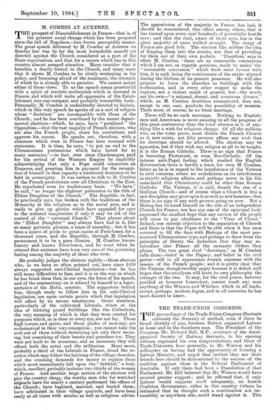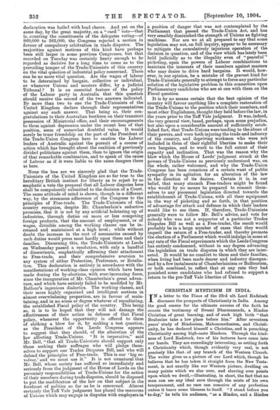declaration was hailed with loud cheers. And yet on the
same day, by the great majority, on a " card " vote—that is, counting the constituents of the delegates voting—of 869,000 to 383,000, the Congress rejected a motion in favour of compulsory arbitration in trade disputes. The majorities against motions of this kind have perhaps been still larger in some previous Congresses, but that recorded on Tuesday was certainly heavy enough to be regarded as decisive for a long time to come as to the prevailing temper of the Trade-Unionists of this country on the vital question of industrial policy concerned. There can be no more vital question. Are the wages of labour to be determined by bargain, collective or individual, or whenever Unions and. masters differ, by a judicial Tribunal ? It is an essential feature of the policy of the Labour party in Australia that this question should receive the second of the two answers indicated. By more than two to one the Trade-Unionists of the United Kingdom declare through their representatives against any such answer. That being so, their con- gratulations to their Australian brethren on their transient possession of Ministerial office, and their encouragements to them against depression under the recent loss of that position, seem of somewhat doubtful value. It would surely be truer friendship on the part of the President of the Trade-Union Congress here to caution the Labour leaders of Australia against the pursuit of a course of action which has brought about the coalition of previously divided politicians against them, than to ignore the origin of that remarkable combination, and to speak of the cause of Labour as if it were liable to the same dangers there as here.
None the less are we sincerely glad that the Trade- Unionists of the United Kingdom are so far true to the hereditary British instinct for liberty as to reject by so emphatic a vote the proposal that all Labour disputes here shall be compulsorily submitted to the decision of a Court. The same attitude of mind, is shown, though in a different way, by the strenuous adherence of the Congress to the principles of Free-trade. The Trade-Unionists of this country recognise, despite Mr. Chamberlain's seductive promises, that it is not by any artificial bolstering up of industries, through duties on more or less competing foreign products, that the amount of employment, or of wages, divisible among the working classes can be in- creased and maintained at a high level ; while without doubt the increase in the cost of necessaries caused by such duties would press most hardly upon them and their families. Discerning this, the Trade-Unionists at Leeds on Wednesday passed a resolution, with only a handful of dissentients, emphatically affirming their attachment to Free-trade, and their comprehensive aversion to any system of either Protection, Preference, or Retalia- tion. This declaration is entirely in accordance with the manifestations of working-class opinion which have been made during the by-elections, with ever-increasing force, since the inauguration of Mr. Chamberlain's great adven- ture, and which have entirely failed to be modified by Mr. Balfour's ingenious dialectics. The working classes, and their more highly organised and intelligent sections in almost overwhelming proportion, are in. favour of main- taining, and in no sense or degree whatever of repudiating, the established Fiscal policy of the country. This being so, it is to be hoped that they will not damage the effectiveness of their action in defence of that Fiscal policy, whenever the opportunity is offered to them of striking a blow for it, by making a test question, as the President of the Leeds Congress appears to suggest that they should, of the alteration of the law affecting Trade-Unions. "It is imperative," said Mr. Bell, "that all Trade-Unionists should support only those seeking their suffrages who will pledge them- selves to support our Trades Disputes Bill, and who will defend the principles of Free-trade. This is our big re- volver,' and we must use it." It is not unnatural that Mr. Bell, whose society has suffered so immediately and seriously from the judgment of the House of Lords on the pecuniary responsibilities of Trade-Unions for the action of their members during trade disputes, should be disposed to put the modification of the law on that subject in the forefront of politics so far as he is concerned. Almost certainly the Taff Vale judgment has placed the resources of Unions which may engage in disputes with employers in a position of danger that was not contemplated by the Parliament that passed the Trade-Union Act, and has very sensibly diminished the strength of Unions as fighting machines. Nor are we at all prepared to say that some legislation may not, on full inquiry, appear to be necessary to mitigate the cumulatively injurious operation of the decision in question, and of the view which has lately been held judicially as to the illegality even of " peaceful " picketing, upon the powers of Labour combinations to maintain the interests of their members against masters who may desire to drive hard bargains. It would, how- ever, in our opinion, be a mistake of the gravest kind for Trade-Unionists generally to attempt to force any particular solution of the legislative problem in this connection upon Parliamentary candidates who are at one with them on the Fiscal question.
It is by no means certain that the best opinion of the country will favour anything like a complete restoration of the Trade-Unions to the position which their members, and most other Englishmen, thought they held before the law, in the years prior to the Taff Vale judgment. It was, indeed, the very general view, based, perhaps, upon some prejudice, but also upon a considerable amount of sufficiently estab- lished fact, that Trade-Unions were tending to the abuse of their powers, and were both injuring the trade and industry of the country, and depriving workmen who were not included in them of their rightful liberties to make their own bargains, and to work to the full extent of their capacity and inclination. That was the reason why the blow which the House of Lords' judgment struck at the powers of Trade-Unions as previously understood was, on the whole, rather welcomed, and why the Trade-Union Congress has been conscious of a certain want of public sympathy in its agitation for an alteration of the law in the direction of its desires. Certain it is, in our belief, that many staunch Free-traders might be found who would by no means be prepared to commit them- selves to any piecemeal legislation directed towards the establishment of Trade-Unions, with all their equipment in the way of picketing and so forth, in that position of advantage for attack and defence in which their leaders would like to see them. If, therefore, Trade-Unionists generally were to follow Mr. Bell's advice, and vote for nobody who was not a supporter of a particular Trades Disputes Bill as well as a Free-trader, the result would probably be in a large number of cases that they would imperil the return of a Free-trader, and thereby promote the election of a Parliament which would indulge in some at any rate of the Fiscal experiments which the Leeds Congress has entirely condemned, without in any degree advancing the legislation on trade disputes in which they are inter- ested. It would be no comfort to them and their families, when living had been made dearer and industry disorgan- ised by a few instalments of Chamberlainism or Balfouriim, or both combined, to reflect that at any rate they had punished some candidates who had refused to support a return to the pre-Taff Vale liberties of Unions.



































 Previous page
Previous page